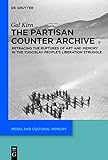The Partisan Counter-Archive : Retracing the Ruptures of Art and Memory in the Yugoslav People's Liberation Struggle / Gal Kirn.
Material type: TextSeries: Media and Cultural Memory ; 27Publisher: Berlin ; Boston : De Gruyter, [2020]Copyright date: ©2020Description: 1 online resource (XIII, 309 p.)Content type:
TextSeries: Media and Cultural Memory ; 27Publisher: Berlin ; Boston : De Gruyter, [2020]Copyright date: ©2020Description: 1 online resource (XIII, 309 p.)Content type: - 9783110681390
- 9783110682151
- 9783110682069
- 704.9499497022 23/ger
- online - DeGruyter
- Issued also in print.
| Item type | Current library | Call number | URL | Status | Notes | Barcode | |
|---|---|---|---|---|---|---|---|
 eBook
eBook
|
Biblioteca "Angelicum" Pont. Univ. S.Tommaso d'Aquino Nuvola online | online - DeGruyter (Browse shelf(Opens below)) | Online access | Not for loan (Accesso limitato) | Accesso per gli utenti autorizzati / Access for authorized users | (dgr)9783110682069 |
Browsing Biblioteca "Angelicum" Pont. Univ. S.Tommaso d'Aquino shelves, Shelving location: Nuvola online Close shelf browser (Hides shelf browser)
Frontmatter -- Foreword -- Contents -- Introduction: The “Primitive Accumulation” of Revisionist Memory: A Plea for the Partisan Counter-Archive -- Chapter 1 The Three Impossibilities of the Partisan Counter-Archive: Politics, Art and the ‘Anti-memory’ of Rupture -- Chapter 2 Early Partisan Photography, Film and Poetry (1941–1945): An Oath to Past and Future Struggles -- Chapter 3 Continuing the Partisan Rupture by Other Means: From Black Wave Films to Late Modernist Monuments to Revolution (1960s–70s) -- Chapter 4 Undoing the Partisan Counter-Archive? From Nationalist(ic) Reconciliation to the Rehabilitation of Fascism -- Conclusion: Retrieving the Counter-Archive Beyond Yugoslavia -- Afterword: Concrete utopia lasts forever – Branko Miljković’s Yugoslavia -- List of Images -- Bibliography -- Index
restricted access online access with authorization star
http://purl.org/coar/access_right/c_16ec
Mere decades after the dissolution of Yugoslavia, the promise of European democracy seems to be out of joint. What has become of the once-shared memory of victory over fascism? Historical revisionism and nationalist propaganda in the post-Yugoslav context have tried to eradicate the legacy of partisan and socialist struggles, while Yugonostalgia commodifies the partisan/socialist past. It is against these dominant ‘archives’ that this book launches the partisan counter-archive, highlighting the symbolic power of artistic works that echo and envision partisan legacy and rupture. It comprises a body of works that emerged either during the people's liberation struggle or in later socialist periods, tracing a counter-archival surplus and revolutionary remainder that invents alternative protocols of remembrance and commemoration. The book covers rich (counter-)archival material – from partisan poems, graphic works and photography, to monuments and films – and ends by describing the recent revisionist un-doing of the partisan past. It contributes to the Yugoslav politico-aesthetical “history of the oppressed” as an alternative journey to the partisan past that retrieves revolutionary resources from the past for the present.
Issued also in print.
Mode of access: Internet via World Wide Web.
In English.
Description based on online resource; title from PDF title page (publisher's Web site, viewed 25. Jun 2024)









